According to data from the United Nations Environment Programme, between 190,000 to 230,000 tons of plastic waste ultimately end up in the oceans, rivers and other water bodies every year. In Manila, Philippines, before the waste finally ends up in the sea.
The main reason waste ultimately ends up in rivers is: waste management does not work in developing countries. Local waste collectors do indeed collect valuable plastics, such as beverage bottles made from PET plastic. Everything else is deliberately dumped into the river. Poverty takes priority over environmental awareness.
Especially rivers, because rivers are the cheapest way to get rid of waste. When they throw it into the river, the garbage will disappear with the river water, without having to pay landfill fees.
The problem of plastic waste in waterways is so great that many parties want to get involved. For example, Riverrecycle Oy, headquartered in Finland, has developed a way to curb the plastic waste plaguing the oceans. Together with partners, the company has collected 1 million kilograms of waste from rivers in developing countries in just a few years. This Finnish startup's invention has succeeded where many others have not: removing plastic waste from waterways.
The invention is not complicated: a floating boom that can stop plastic fragments and equipment to lift it to shore. The real innovation is the commercially viable business model that makes waste collection economically feasible, which requires stable and efficient plastic flotation washing and electrostatic separation systems at the back end.